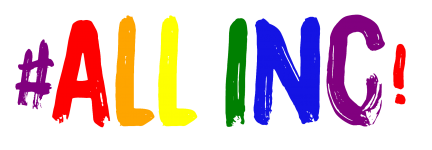Project Summary
All Inc! promotes inclusive education by bringing together pupils, (trainee) teachers and the wider school community to build LGBT+ friendly schools.
Schools play a critical role in providing pupils – all pupils – with a healthy and encouraging learning environment. Too often, however, pupils who identify as LGBT+ fail to get the support they need for their personal and professional development. Many also still face verbal and even physical harassment because of their sexual orientation or identity. This continues to translate into higher dropout rates, a higher incidence of mental health problems and even higher self-harm and suicide rates.
Despite many laudable initiatives, much more needs to be done to build school environments that are safe and secure for all pupils. This is particularly important for transgender, intersex and other pupils who do not identify as heterosexual or cisgender, but who also do not identify as homosexual or bisexual (the more commonly known and accepted ‘LGB’ of the acronym). Little visibility and small numbers mean these young people are particularly vulnerable, and all the more in need of recognition, respect and support.
The European Union remains one of the leading global defenders of the LGBT+ community, but even within Europe’s borders, gender equality still leaves much to be desired. ILGAEurope’s latest report, presented in Brussels in February 2020, paints “a complex picture that diverges from the widespread narrative that all is well for LGBTI people in large parts of Europe. Central to this is a sharp rise in anti-LGBTI hate speech carried out by public figures across Europe – in countries ranging from Bulgaria, Poland and Turkey, to Cyprus, Finland, Greece, Portugal and Spain – and the very real consequences of this for LGBTI individuals and groups.”
The European Parliament adopted a resolution on 14 February 2019 calling on the Commission to commit to tackling the gender equality backlash targeting LGBTI people across Europe, prioritise LGBTI rights in its work in 2019-2024, and mainstream an inter-sectional perspective in its work, among others. The backlash that can be seen and felt across the continent is a worrying trend, and much work will need to be done to ensure that the gains made are not lost.
All Inc! sets out to shape school environments at secondary and tertiary level that allow all students to thrive, regardless of their sexual orientation or sexual identity. Taking a crosssectoral approach, the partnership will facilitate cooperation between eight countries, with one university and one secondary school participating from each country. In each country, the participating institutions will co-create a vision for an LGBT+ friendly school, along with ‘tools for schools’ teachers can use to make such inclusive schools a reality. All outputs will build on original research and peer exchange, to maximise cross-country learning.
To successfully develop and deliver these LGBT+ friendly school visions, All Inc! will implement carefully calibrated activities that 1) engage all partners throughout the duration of the project 2) facilitate cross-country learning to distill a European vision for LGBT+ friendly schools and 3) deepen cross-sectoral collaboration between secondary schools and teacher training institutions in each country.
Importantly, All Inc! aims to practice what is preaches. School visions will be developed with pupils – not simply on their behalf – and the inputs and feedback of all those who, directly or indirectly, support education will be invited. All Inc! will seek to learn from pupils, parents, teachers, students and teachers at higher education institutions, and, as much as possible, will engage the wider school community as well. Story telling and social media will support dissemination beyond the partner schools, with the explicit aim of ‘going viral’ with the LGBT+ school vision.
The project intends to make an active contribution towards establishing intercultural dialogue on gender equality, and will have a significant impact on the acceptance and understanding of sexual diversity and social inclusion. Thanks to the comprehensive geographical reach of the partner countries involved, the project will be able to draw on, and be relevant to, a rich and diverse set of European countries and contexts.
